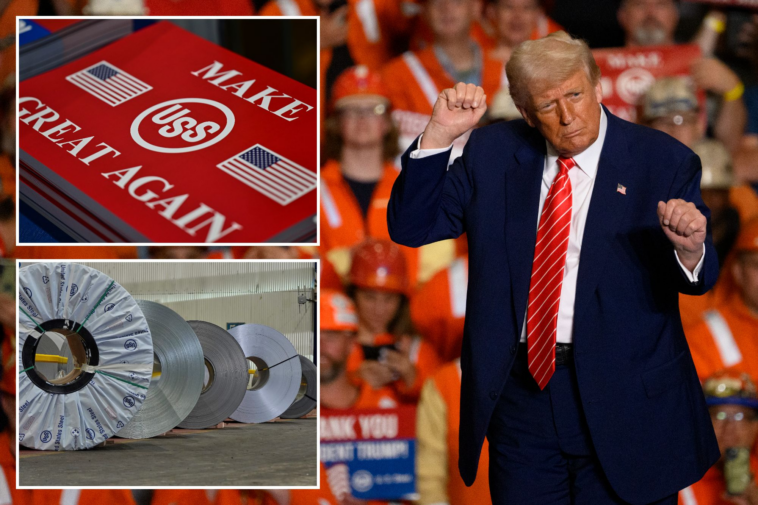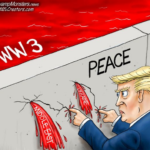Nippon Steel’s $14.9 billion acquisition of US Steel closed on Wednesday, the companies said, confirming an unusual degree of power for President Trump after the Japanese company’s 18-month struggle to close the purchase.
Under the deal terms, Nippon bought 100% of US Steel shares at $55 per share, as it first laid out in its December 2023 offer for the well-known and struggling steelmaker.
The companies also disclosed details of a national security agreement inked with the Trump administration, which gives Trump the authority to name a board member as well as a non-economic golden share.
The measures represent an unusual level of control conceded by the companies to the government to save the deal, after a rocky path to approval spurred by high-level political opposition.
The inclusion of the golden share in particular to win approval from the Committee on Foreign Investment in the US, which scrutinizes foreign investment for national security risks, could drive overseas investors away from US companies, national security lawyers have said.
“The optics of a golden share – they suggest that it’s a little bit harder to divorce pure national security analysis from political decision making,” said Josh Gruenspecht, a national security lawyer at Wilson Sonsini.
Still, Eiji Hashimoto, Nippon Steel’s Chairman and CEO, thanked Trump for his role, adding that “Nippon Steel is excited about opening a new chapter of US Steel’s storied history.”
The press release announcing the deal notes the golden share gives the US government rights, including, “The right to appoint one independent director; and Consent rights of the President of the United States, or his designee, on specific matters.”
In fact, the US government will have veto authority over a raft of corporate decisions, from idling plants to cutting production capacity and moving jobs overseas, as previewed in a weekend social media post by Commerce Secretary Howard Lutnick.
The share also gives the government a veto over a potential relocation of US Steel’s headquarters from Pittsburgh, a transfer of jobs overseas, a name change, and any potential future acquisition of a rival business, the release shows.
The United Steelworkers union, which has vehemently opposed the deal, said it would “continue watching, holding Nippon to its commitments,” adding that the golden share gives Trump a “startling degree of personal power over a corporation.”
86 million tons of steel capacity
For Nippon Steel, securing a foothold in the US is key to its global growth strategy. The American steel market, including demand for high-grade steel, Nippon Steel’s specialty, is growing amid rising global trade tensions.
The acquisition will give US Steel $11 billion investment in investment through 2028, including $1 billion for a new US mill that will increase by $3 billion in later years, as first reported by Reuters.
It will also allow Nippon Steel, the world’s fourth-largest steel company, to capitalize on a host of American infrastructure projects while its foreign competitors face steel tariffs of 50%. The Japanese firm also avoids the $565 million in breakup fees it would have had to pay if the companies had failed to secure approvals.
Nippon Steel said on Wednesday its annual crude steel production capacity is expected to reach 86 million tons, bringing it closer to Nippon Steel’s global strategic goal of 100 million tons of global crude steel production capacity.
Kim Ward, a Republican state Senator in Pennsylvania, where US Steel is headquartered, said the deal “marks a new era for domestic steel and reaffirms our position as a global leader in the industry.”
A rocky path
The deal’s closing was hardly guaranteed, though many investors saw approval as likely after Trump headlined a rally on May 30 giving his vague blessing to an “investment” by Nippon Steel, which he described as a “great partner.”
After the United Steelworkers union came out against the deal last year, both then-President Joe Biden, a Democrat, and Trump, a Republican, expressed their opposition as they sought to woo voters in Pennsylvania, a key swing state, in the presidential election campaign.
Shortly before leaving office in January, Biden blocked the deal on national security grounds, prompting lawsuits by the companies, which argued the national security review they received was biased. The Biden White House disputed the charge.
The steel companies saw a new opportunity in the Trump administration, which opened a fresh 45-day national security review into the proposed merger in April.
But Trump’s public comments, ranging from welcoming a simple “investment” in US Steel by the Japanese firm to floating a minority stake for Nippon Steel, spurred confusion.
Trump’s May 30 rally spurred hopes approval, and sign-off finally came on Friday with an executive order giving the companies permission to combine if they signed an NSA giving the US government a golden share, which they did.



